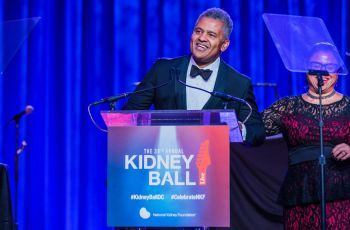
WASHINGTON (Aug. 3, 2016) — The George Washington University (GW) Ron & Joy Paul Kidney Center has launched a kidney health education campaign in the Washington, D.C. area, which has the highest prevalence of kidney disease in the U.S. Advertisements encouraging residents to check their kidney health have started to appear on buses, with television, radio and digital media advertisements appearing throughout the next year.
“The incidence of end-stage renal disease in the Washington, D.C. area is striking,” said Tony Englert, director of the GW Ron & Joy Paul Kidney Center, housed within the GW School of Medicine and Health Sciences and within the GW Transplant Institute at GW Hospital. “Raising awareness about kidney health and treatment options is at the heart of what we do here at the Ron & Joy Paul Kidney Center, and is imperative for our community.”
The advertisements will go hand in hand with information sessions and free screenings across the city, but with a focus in Wards 7 and 8, where kidney disease is most prevalent.
“The fact is, 1 in 3 adults in the U.S. are at risk for kidney disease, and many of those who have kidney disease don’t even know they have it,” said Keith Melancon, M.D., chief of the GW Transplant Institute at GW Hospital and professor of surgery at the GW School of Medicine and Health Sciences. “Kidney failure is often preventable. A simple test can slow or even prevent kidney disease. We want people to know this.”
The Ron & Joy Paul Kidney Center was established with a $2.5 million gift from The Ron & Joy Paul Foundation, established by Ron Paul, chairman and co-founder of EagleBank, and founder of Ronald Paul Companies, a real estate development company, and his wife, Joy.
“Early detection of kidney disease is critical. We hope that people see our advertisements, attend our events, and decide to get tested - because it could save their lives," said Paul, a two-time kidney transplant recipient. "Our goal is to ensure that people know their options and understand that there is life after kidney disease or kidney failure.”
The Center, which launched in fall 2015, partners with the GW Transplant Institute at GW Hospital. The GW Transplant Institute opened at the beginning of 2015 and was established to provide access to underserved patients in the Washington, D.C. area. It offers a multidisciplinary kidney transplant program with the specialty services required to care for transplant surgery patients in the region. To date, the GW Transplant Institute has performed more than 65 kidney transplants.
For more information, please visit gwkidney.org.
Media: For more information, please contact Lisa Anderson at lisama2 [at] gwu [dot] edu (lisama2[at]gwu[dot]edu) or 202-994-3121.
###
About the GW School of Medicine and Health Sciences
Founded in 1824, the GW School of Medicine and Health Sciences (SMHS) was the first medical school in the nation’s capital and is the 11th oldest in the country. Working together in our nation’s capital, with integrity and resolve, the GW SMHS is committed to improving the health and well-being of our local, national, and global communities.
About GW Hospital
The George Washington University Hospital is a 385-bed tertiary care, academic medical center located in downtown Washington, D.C. Featuring a Level I Trauma Center and a Level III NICU, GW Hospital offers clinical expertise in a variety of areas including cardiac, cancer, neurosciences, women’s health, and advanced surgery including robotic and minimally invasive surgery. The mission of the George Washington University Hospital is to provide the highest quality health care, advanced medical technology and world-class service to its patients in an academic medical center dedicated to education and research. GW Hospital is jointly owned and operated by George Washington University and a subsidiary of Universal Health Services, Inc. (UHS).
